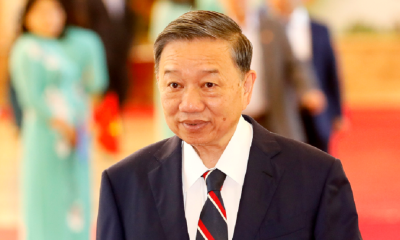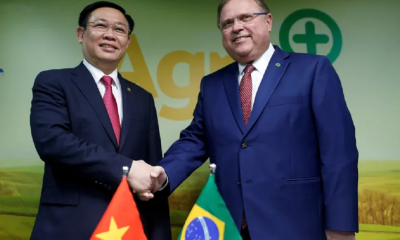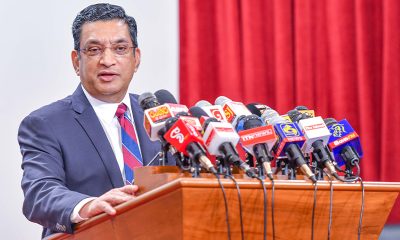Business
Vietnamese billionaire Truong My Lan sentenced to death for $44bn fraud
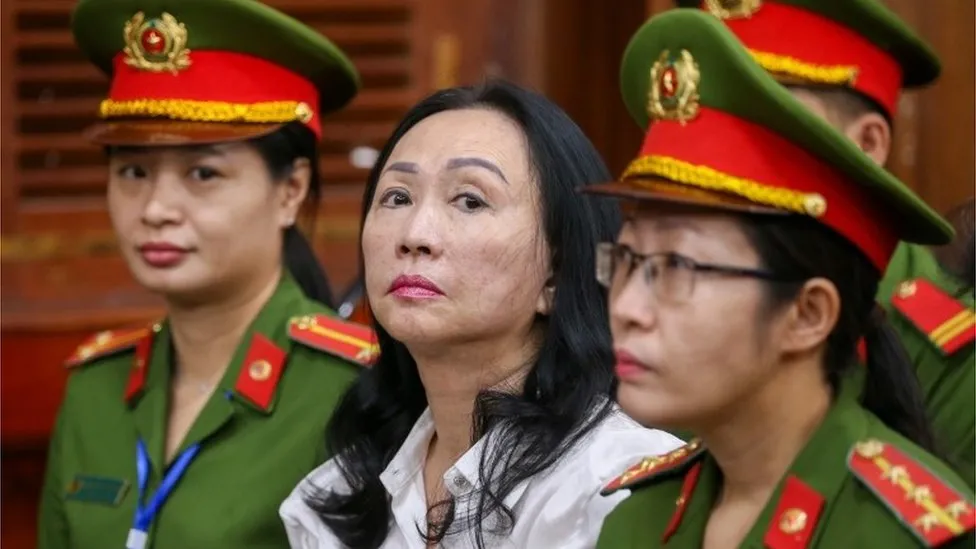
It was the most spectacular trial ever held in Vietnam, befitting one of the greatest bank frauds the world has ever seen.
Behind the stately yellow portico of the colonial-era courthouse in Ho Chi Minh City, a 67-year-old Vietnamese property developer was sentenced to death on Thursday for looting one of the country’s largest banks over a period of 11 years.
It’s a rare verdict – she is one of very few women in Vietnam to be sentenced to death for a white collar crime.
The decision is a reflection of the dizzying scale of the fraud. Truong My Lan was convicted of taking out $44bn (£35bn) in loans from the Saigon Commercial Bank. The verdict requires her to return $27bn, a sum prosecutors said may never be recovered. Some believe the death penalty is the court’s way of putting pressure on her to help locate the missing billions.
The habitually secretive communist authorities were uncharacteristically forthright about this case, going into minute detail for the media. They said 2,700 people were summoned to testify, while 10 state prosecutors and around 200 lawyers were involved.
The evidence was in 104 boxes weighing a total of six tonnes. Eighty-five defendants were tried with Truong My Lan, who denied the charges.
“There has never been a show trial like this, I think, in the communist era,” says David Brown, a retired US state department official with long experience in Vietnam. “There has certainly been nothing on this scale.”
The trial was the most dramatic chapter so far in the “Blazing Furnaces” anti-corruption campaign led by the Communist Party Secretary-General, Nguyen Phu Trong.
A conservative ideologue steeped in Marxist theory, Nguyen Phu Trong believes that popular anger over untamed corruption poses an existential threat to the Communist Party’s monopoly on power. He began the campaign in earnest in 2016 after out-manoeuvring the then pro-business prime minister to retain the top job in the party.
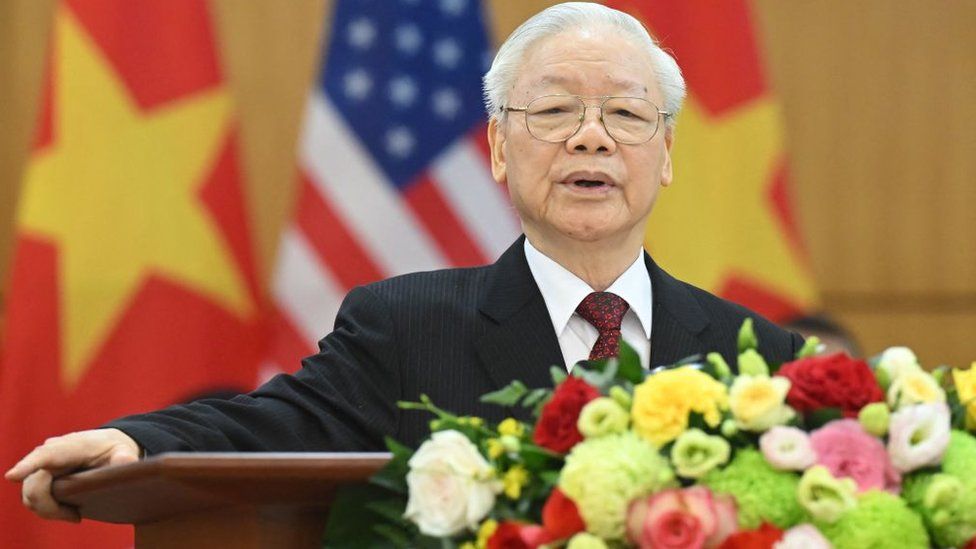
Communist Party General Secretary Nguyen Phu Trong is leading an anti-corruption campaign (BBC)
The campaign has seen two presidents and two deputy prime ministers forced to resign, and hundreds of officials disciplined or jailed. Now one of the country’s richest women has joined their ranks.
Truong My Lan comes from a Sino-Vietnamese family in Ho Chi Minh City, formerly Saigon. It has long been the commercial engine of the Vietnamese economy, dating well back to its days as the anti-communist capital of South Vietnam, with a large, ethnic Chinese community.
She started as a market stall vendor, selling cosmetics with her mother, but began buying land and property after the Communist Party ushered in a period of economic reform, known as Doi Moi, in 1986. By the 1990s, she owned a large portfolio of hotels and restaurants.
Although Vietnam is best known outside the country for its fast-growing manufacturing sector, as an alternative supply chain to China, most wealthy Vietnamese made their money developing and speculating in property.
All land is officially state-owned. Getting access to it often relies on personal relationships with state officials. Corruption escalated as the economy grew, and became endemic.
By 2011, Truong My Lan was a well-known business figure in Ho Chi Minh City, and she was allowed to arrange the merger of three smaller, cash-strapped banks into a larger entity: Saigon Commercial Bank.
Vietnamese law prohibits any individual from holding more than 5% of the shares in any bank. But prosecutors say that through hundreds of shell companies and people acting as her proxies, Truong My Lan actually owned more than 90% of Saigon Commercial.
They accused her of using that power to appoint her own people as managers, and then ordering them to approve hundreds of loans to the network of shell companies she controlled.
The amounts taken out are staggering. Her loans made up 93% of all the bank’s lending.
According to prosecutors, over a period of three years from February 2019, she ordered her driver to withdraw 108 trillion Vietnamese dong, more than $4bn (£2.3bn) in cash from the bank, and store it in her basement.
That much cash, even if all of it was in Vietnam’s largest denomination banknotes, would weigh two tonnes.
She was also accused of bribing generously to ensure her loans were never scrutinised. One of those who was tried used to be a chief inspector at the central bank, who was accused of accepting a $5m bribe.
The mass of officially sanctioned publicity about the case channeled public anger over corruption against Truong My Lan, whose haggard, unmade-up appearance in court was in stark contrast to the glamorous publicity photos people had seen of her in the past.
But questions are also being asked about why she was able to keep on with the alleged fraud for so long.
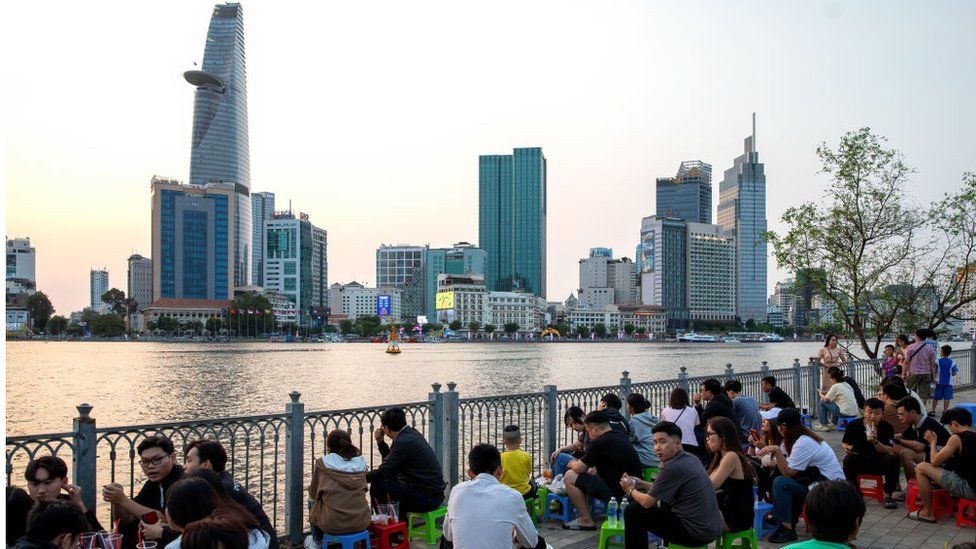
The trial took place in Ho Chi Minh City, where Saigon Commercial Bank was based (BBC)
“I am puzzled,” says Le Hong Hiep who runs the Vietnam Studies Programme at the ISEAS – Yusof Ishak Institute in Singapore. “Because it wasn’t a secret. It was well known in the market that Truong My Lan and her Van Thinh Phat group were using SCB as their own piggy bank to fund the mass acquisition of real estate in the most prime locations. “It was obvious that she had to get the money from somewhere. But then it is such a common practice. SCB is not the only bank that is used like this. So perhaps the government lost sight because there are so many similar cases in the market.”
David Brown believes she was protected by powerful figures who have dominated business and politics in Ho Chi Minh City for decades. And he sees a bigger factor in play in the way this trial is being run: a bid to reassert the authority of the Communist Party over the free-wheeling business culture of the south. “What Nguyen Phu Trong and his allies in the party are trying to do is to regain control of Saigon, or at least stop it from slipping away.
“Up until 2016 the party in Hanoi pretty much let this Sino-Vietnamese mafia run the place. They would make all the right noises that local communist leaders are supposed to make, but at the same time they were milking the city for a substantial cut of the money that was being made down there.”
At 79 years old, party chief Nguyen Phu Trong is in shaky health, and will almost certainly have to retire at the next Communist Party Congress in 2026, when new leaders will be chosen.
He has been one of the longest-serving and most consequential secretary-generals, restoring the authority of the party’s conservative wing to a level not seen since the reforms of the 1980s. He clearly does not want to risk permitting enough openness to undermine the party’s hold on political power.
But he is trapped in a contradiction. Under his leadership the party has set an ambitious goal of reaching rich country status by 2045, with a technology and knowledge-based economy. This is what is driving the ever-closer partnership with the United States.
Yet faster growth in Vietnam almost inevitably means more corruption. Fight corruption too much, and you risk extinguishing a lot of economic activity. Already there are complaints that bureaucracy has slowed down, as officials shy away from decisions which might implicate them in a corruption case.
“That’s the paradox,” says Le Hong Hiep. “Their growth model has been reliant on corrupt practices for so long. Corruption has been the grease that that kept the machinery working. If they stop the grease, things may not work any more.”
(BBC)
Business
From Gut Feel to GPS: Why Sri Lankan brands must own their AI intelligence

Sri Lankan brands are standing at a strategic inflection point. Digital budgets have surged, social platforms have multiplied, and artificial intelligence has moved from novelty to necessity. Yet, despite unprecedented access to data, many organisations remain trapped in reactive decision-making—looking backwards rather than anticipating what lies ahead.
That contradiction was sharply articulated at a industry forum on Tuesday night bringing together global platform experts and local practitioners, where the central question was not whether Sri Lankan brands should adopt AI-powered intelligence, but whether they are prepared to own it.
Angel Calinisan, a global social intelligence leader working across emerging markets from Southeast Asia to South Asia, offered a compelling metaphor that framed the discussion.
“Brands are no longer using social intelligence as a rear-view mirror,” Calinisan said.
“They are starting to use it as a GPS. A rear-view mirror tells you what has already happened. A GPS tells you where you are headed—and warns you before you take the wrong turn.”
According to Calinisan, the most advanced brands are deploying AI-driven listening tools to spot anomalies in real time—early signals that indicate shifts in consumer behaviour, emerging reputational risks, or nascent trends before they peak.
“These anomalies could be negative sentiment during a brewing crisis, or they could be the first signs of a behavioural change,” he explained. “AI does what humans cannot do at scale—monitor conversations 24/7, identify what has changed, where it is happening, and who is driving it.”
Crucially, Calinisan stressed that prediction—not reporting—is where competitive advantage now lies. “You need to know whether a trend is just a fad or whether it has velocity and longevity. That predictive layer is what separates leaders from followers.”
For Sri Lankan companies operating in volatile economic and reputational environments, this ability to anticipate rather than react could be the difference between resilience and decline.
One of the most striking insights from Calinisan was her assertion that data is no longer the currency—time is.
“If you read about an issue in the newspaper or see it trending publicly on social media, you are already late,” he warned. “Conversations move across platforms at incredible speed. The brands that survive are the ones that detect signals early and buy themselves time to respond.”
This shift has significant business implications. Early detection allows organisations to protect brand equity, manage crises proactively, and even capitalise on emerging opportunities before competitors are aware they exist.
Calinisan pointed to metrics increasingly used by global brands, such as share of voice, which he said is “highly correlated with market share,” and net sentiment, a measure closely linked to digital brand equity. “These metrics are no longer for reporting decks—they are guiding business decisions.”
Beyond vanity metrics to boardroom relevance
That evolution from surface-level engagement to boardroom relevance was echoed by Anubhav Khanduja, who works closely with enterprise clients across India, South Asia, APEC and global markets.
“Likes and shares are no longer what boards care about,” Khanduja said. “Leadership teams want to see intent and revenue. They want to know how social media contributes to the funnel—from intent creation to conversion and attribution.”
According to Khanduja, enterprise measurement frameworks are rapidly shifting toward metrics that can be directly linked to business outcomes. “Attribution is critical. If you can connect intent and conversion back to your social platforms, that’s when digital earns its seat at the board table.”
This shift reflects a broader maturation of digital marketing—from a communications function to a revenue and growth driver.
As brands juggle five to seven platforms simultaneously, another challenge has emerged: how to centralise operations without flattening the unique culture of each platform.
Khanduja cautioned against the old model of pushing uniform content everywhere. “Content creation has become easy—anyone can do it. What matters now is not missing the essence of what each platform is built for.”
He argued that AI should be used to improve marketer productivity, not replace human judgment. “You can centralise research, workflows and optimisation, while keeping the authentic voice intact and respecting platform-specific nuances.”
The goal, he said, is “doing more with less—without losing relevance.”
A recurring theme throughout the discussion was the danger of outsourcing intelligence entirely to agencies and consultancies.
Calinisan was blunt: “The brands pulling ahead are bringing these capabilities in-house. They have management support, clear KPIs, and training programmes that allow teams to experiment, fail, learn and iterate.”
This internalisation of intelligence allows organisations to respond faster, protect institutional knowledge, and build long-term strategic muscle—rather than “renting insight” on a project-by-project basis.
Khanduja reinforced this view, noting that as trust deficits grow in an age of AI-generated content and saturated advertising, credibility increasingly comes from authentic voices—especially employees.
“Employees are becoming central to brand amplification,” he said. “People trust people more than ads. When organisations activate employees responsibly, they gain reach, credibility and resilience—especially during times of change or crisis.”
For Sri Lanka’s corporate sector, the message was clear. Digital transformation is no longer about spending more on ads or adopting the latest tool. It is about owning intelligence, embedding predictive thinking into decision-making, and aligning technology with culture.
As Calinisan summed it up: “It’s not about having more data. It’s about knowing sooner than everyone else—and having the time to act.”
In an increasingly competitive and uncertain environment, that early insight may well become Sri Lankan brands’ most valuable asset.
By Ifham Nizam
Business
Dialog sponsors Gangaramaya Navam Maha Perahera

Dialog Axiata PLC, Sri Lanka’s #1 connectivity provider, reaffirms its commitment to preserving national heritage by sponsoring the Gangaramaya Navam Maha Perahera for the fourteenth consecutive year, supporting a revered religious celebration while advancing cultural patronage, community stewardship, and corporate responsibility that strengthens shared values and continuity across Sri Lanka.
The annual Gangaramaya Navam Maha Perahera, one of Sri Lanka’s most significant religious and cultural expressions, was held on 31st January and 1st February, drawing thousands of devotees and visitors to the historic Gangaramaya Temple in Colombo. As a long-term patron, Dialog’s continued sponsorship enables the seamless conduct of this eminent Perahera while reinforcing its role as a leading corporate advocate of Sri Lankan culture and heritage.
Beyond the Gangaramaya Navam Maha Perahera, Dialog has been a long-term patron of many significant national events including the Kandy Esala Perahara, Kelaniya Duruthu Festival, Katharagama Esala Perahara and Gatabaru Esala Perahara. These efforts align with the company’s broader heritage preservation initiatives, which include constructing the vestibule for the Dimbulagala Aranya Senasanaya, launching a website and directory of Amarapura Maha Nikaya Temples, and restoring the Anuradhapura Maha Vihara Sannipatha Shalawa.
Business
Kala Pola – Sri Lanka’s iconic open-air art fair – returns

Sri Lanka’s renowned open-air art fair, Kala Pola, is set to bring alive the streets of Colombo with colour, creativity, and conversation as Kala Pola returns for its 33rd edition on Sunday, 8th February, along Ananda Coomaraswamy Mawatha (Green Path), Colombo 07.
Conceptualised and introduced by The George Keyt Foundation in 1993, and sponsored and co-presented by the John Keells Group through an unbroken patronage since 1994, Kala Pola has grown into a cultural landmark that continues to reshape how visual art is showcased and experienced in Sri Lanka. Remaining true to its founding philosophy, the event is proudly uncurated, providing participating artists and sculptors with the opportunity to showcase their talent, connect with art enthusiasts, learn from and network with other artists, and expand their clientele.
Kala Pola displays a broad variety of forms and styles, ranging from intricate sculptures, humorous caricatures, and abstract paintings to modern and traditional Sri Lankan art. Attracting art lovers, collectors, connoisseurs, and students from all parts of the country and tourists from various parts of the world, the event creates a vibrant, welcoming, and wholesome atmosphere spurred by music, camaraderie, art discussions, children’s art workshops, and an array of cultural performances.
As a longstanding and iconic visual art flagship amidst Sri Lanka’s vibrant calendar of arts and cultural events, Kala Pola continues to stand as a unique open-air platform for visual expression. By bringing together both established and emerging artists in an inclusive, uncurated setting in the heart of Colombo, the event fosters meaningful connections between creators and audiences, offering accessibility, diversity, discourse and a shared appreciation for art among a wide cross-section of the public, while spurring the creative economy of the country. Nations Trust Bank (NTB) also supports Kala Pola as its official banking partner.
Arts falls within the focus area of Social Health and Cohesion which is one of the four focus areas of John Keells Foundation (JKF) – the CSR entity of John Keells Holdings PLC (JKH), Sri Lanka’s largest listed conglomerate in the Colombo Stock Exchange operating over 80+ companies in 7 diverse industry sectors. With a history of over 150 years, John Keells Group provides employment to over 18,000 persons and has been ranked as Sri Lanka’s ‘Most Respected Entity’ for 20 Years by LMD Magazine. Whilst being a full member of the World Economic Forum and a Participant of the UN Global Compact, JKH drives its CSR vision of “Empowering the Nation for tomorrow” through JKF.
-

 Opinion6 days ago
Opinion6 days agoSri Lanka, the Stars,and statesmen
-

 Business5 days ago
Business5 days agoHayleys Mobility ushering in a new era of premium sustainable mobility
-

 Business2 days ago
Business2 days agoSLIM-Kantar People’s Awards 2026 to recognise Sri Lanka’s most trusted brands and personalities
-

 Business5 days ago
Business5 days agoAdvice Lab unveils new 13,000+ sqft office, marking major expansion in financial services BPO to Australia
-

 Business5 days ago
Business5 days agoArpico NextGen Mattress gains recognition for innovation
-

 Business4 days ago
Business4 days agoAltair issues over 100+ title deeds post ownership change
-

 Business4 days ago
Business4 days agoSri Lanka opens first country pavilion at London exhibition
-

 Editorial5 days ago
Editorial5 days agoGovt. provoking TUs


